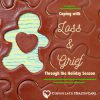Some people joke that pizza is the great equalizer. That one’s pizza preferences can either unite or divide people of all cultures and walks of life. In actuality, the true great equalizer stems from something much deeper. People of all ages, backgrounds, classes, races, genders, ethnicities, and nationalities have to face up to and deal with loss, and carry the stone of grief. Sadly, to love and to grieve is to be human.
For many people, grief feels amplified during the holiday season. It’s the special annual occasions that bitterly and consistently remind us of those loved ones who are no longer in our lives.
Perhaps nothing can ever truly lift the stone of loss and grief completely, but if you find yourself struggling under its weight, consider trying (or giving a second chance to) these coping strategies.
Give back – Channel your love and pain into something productive and purposeful, if you can. Serve and/or donate to a charity or another cause your loved one cared about. There are nearly limitless ideas on how to show compassion and serve others, whether that’s donating clothing, pitching in at a soup kitchen, writing a letter to someone who needs a kind word, calling up a lonely friend or family member, or shoveling snow for an elderly neighbor. The opportunities for goodwill are endless.
Re-evaluate traditions – Many families have annual holiday traditions. However, in the wake of loss, grief can transform once happy memories into painful reminders of how life has changed in the aftermath. Proactively think about how you want to cope with these situations. What traditions would be helpful or healthy for you to continue, if there are any at all? Or maybe you could start a new tradition, perhaps one that honors your lost loved one. Ultimately, do what would be most useful and healing to you and your family.
Support groups – It’s not everyone’s cup of tea, but you may want to try finding a local grief support group in your area.
Location, location, location – Consider where you want to spend the holidays (within reason and in your financial ability) and how that may affect you emotionally. That said, as the saying goes: “Wherever you are, there you are.”
Connecting through tech – Facebook has free support groups to utilize without ever leaving your home. There are also apps such as Goodgrief to connect with others who are dealing with the loss of loved ones.
Relaxation videos – Utilize free guided visualizations and ASMR (autonomous sensory meridian response) videos on the internet, especially via YouTube. It won’t heal your grief by any means, but it can provide a positive distraction, and help you sleep if you deal with insomnia.
Counseling – This is an obvious contender. Unfortunately, talk therapy (otherwise known as counseling or psychotherapy) can be very expensive. However, some therapists accept health insurance. Psychology Today is a good resource to locate available therapists near you. That said, if in-person therapy still isn’t an option for you financially, there are online resources such as Betterhelp.com.
Keep in touch – Email, chat message, or send a holiday card to friends of your lost loved one, if you feel led to. People deal with loss and grief in different ways, and depending on your situation, it may (or may not) be healthy to reach out to your loved one’s friends/family. Chances are they’re hurting and struggling too.

Cancel the holidays – This isn’t feasible for everyone, especially for families with young children, but it’s not a crime to take a note from Christmas With the Kranks and take the year off on holiday celebrations. There’s no law that says you have to be festive or observe any holidays if you’re not up to it.
Journal – Writing in a diary may or may not not be therapeutic or cathartic for you at all. It may even feel like a chore. But there is worth in expressing your thoughts and feelings, and documenting your life and grieving process. You never know how you might be able to use your writings later on down the road, whether for yourself or to help someone else through a time of pain and grief.
Self-care – Give yourself a break. Don’t feel pressured to carry on with the same holiday practices you joined in past years, like decorating your home for Christmas, or cooking an elaborate dinner for family or a company potluck.
No social obligations – While social interactions and outings can be beneficial, don’t feel obligated to say yes to all invitations, whether it’s a Christmas party, a coffee date, or anything in between. You’re allowed to have your own space. Grief is exhausting enough without having to expend the energy being social.
White elephant – Humor is a survival tool and a positive coping mechanism. When you’re not feeling “merry and bright,” it helps to make a joke out of things. Maybe you support the meaning of Christmas, Hanukkah, or Kwanzaa, but the commercialization of the holidays is another vehicle altogether. It’s possible to honor the true messages behind the holidays and throw out the more superficial layers, especially as it pertains to your own grief and coping and/or healing process. Throw in some “white elephant” or gag gifts to friends and family this year. Go into the dollar store, Walmart, drugstore, etc., and see what you can find with ten or fifteen dollars. Have a contest for who can gift the most outrageous present on Christmas.
Take a walk – This coping mechanism is tried and true, and perhaps overused, like a broken record. Maybe you don’t get that mystical rush of endorphins or “runner’s high” like some athletes claim to have. That’s okay. Take a walk, listen to some music (but stay aware of your surroundings), and get some fresh air. It doesn’t fix anything, but it can make you feel more in touch with yourself and your thoughts at the very least.
If you found an error, highlight it and press Shift + Enter or click here to inform us.



